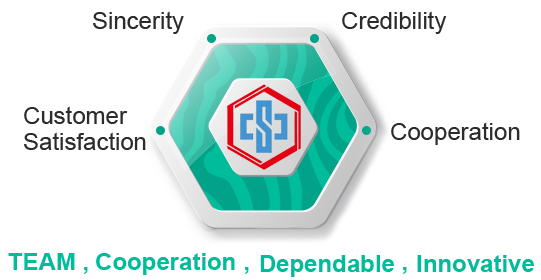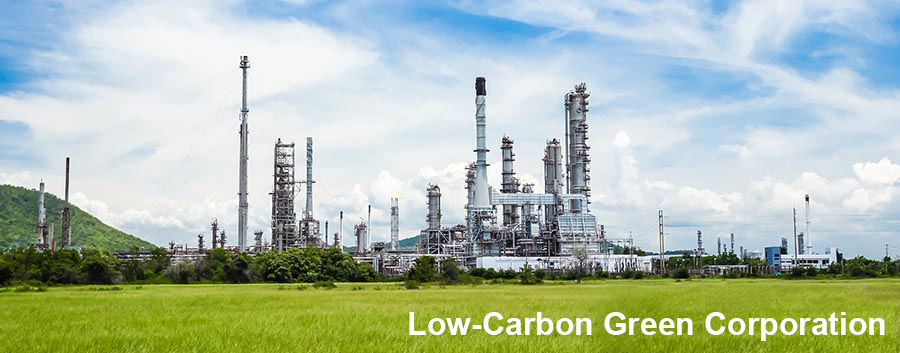Message from the Top Management
Having established a long-standing operational system entailing research and development (R&D), production, marketing, and service based on coal chemical, we at CSCC are also actively moving into the area of carbon materials. Specifically, mesophase graphites are used as anode materials for power batteries in electric cars, electric buses, electric scooters, consumer electronics, and storage systems, while advanced carbon materials can be applied to supercapacitors for wind power generation and light rail vehicles and lead-acid batteries for start-stop systems in vehicles. Both types of carbon materials are green products that serve as key green materials for a low-carbon environment.

The Company has conducted multiple debottlenecking efforts at the light oil plant, enabling an increase in processing capacity. By 2027, the Company expects to secure a minimum of 30,000 metric tons of light oil feedstock annually. However, with the rapid expansion and commissioning of several large-scale coal tar processing plants in mainland China in recent years, industry overcapacity is anticipated, which may adversely impact the Company's operations. Furthermore, the Company’s coal tar plant has been in operation for over 30 years, and aging equipment requires significant investments in occupational safety and environmental protection in response to increasingly stringent domestic regulations. To maintain competitiveness and ensure stable operations, the Company must continue to pursue profitability through intelligent management, process and equipment improvements, enhanced workplace safety and environmental compliance, and continuous quality enhancement.
In addition to maintaining a steady focus on the coal tar chemical business, the Company is actively advancing the development of advanced carbon materials. The revenue contribution from green energy industries—such as anode materials—will gradually increase. Expansion projects including Phase II of the graphitization furnace and the halogen purification furnace production line are being implemented to meet the growing demand from clients in Taiwan, China, Japan, South Korea, and Europe. These products support applications in 3C electronics, wind power, energy storage systems, and start-stop vehicle systems. Moreover, the Company has successfully extended its reach into additive materials for lead-acid battery anodes, significantly prolonging battery life. Going forward, the Company will continue developing mesocarbon microbead (MCMB) anode materials, scaling up supercapacitor carbon material production, and expanding applications of isotropic graphite. These efforts aim to enhance product value and drive long-term growth by promoting high-value-added carbon and graphite products for the green industry.

To further its ESG initiatives, the Company established the Corporate Governance and Sustainability Committee in 2021 to oversee and manage ESG-related matters. Rolling short-, medium-, and long-term ESG targets are set annually. In the governance dimension, the focus areas include compliance with the Corporate Governance 3.0 initiative, intellectual property management, cybersecurity, and regulatory compliance. Key initiatives include cybersecurity certifications, maintenance of IP certifications and employee training, climate-related disclosures, assessment of government-imposed carbon fees, and alignment with Corporate Governance 3.0 topics. In the social dimension, the Company emphasizes labor relations and talent development, promotes ESG management across suppliers and contractors, and implements initiatives related to employee health, occupational safety, and community engagement. In the environmental dimension, efforts are centered on energy conservation and waste reduction. In line with global decarbonization trends and Taiwan’s 2050 Net-Zero Emissions goal, the Company has completed its internal carbon inventory and developed a decarbonization roadmap, with short-, medium-, and long-term reduction targets. Additionally, the Company has commissioned the Green Energy and Environment Research Laboratories of ITRI to assist in gradually upgrading its facilities to energy-saving systems, supporting the achievement of decarbonization goals.
Looking ahead, we will keep striving for a friendly environment, engaging in innovation, and fulfilling social responsibilities on top of the foundation we have built while maintaining good interaction and communication with various stakeholders. With the issuance of this Report, we endeavor to examine our action strategies and related performance, and make timely revisions to our short-, medium-, and long-term sustainable development strategies while forging progress at all times, so that we can become an excellent enterprise that cares for the Earth and realizes sustainable development.